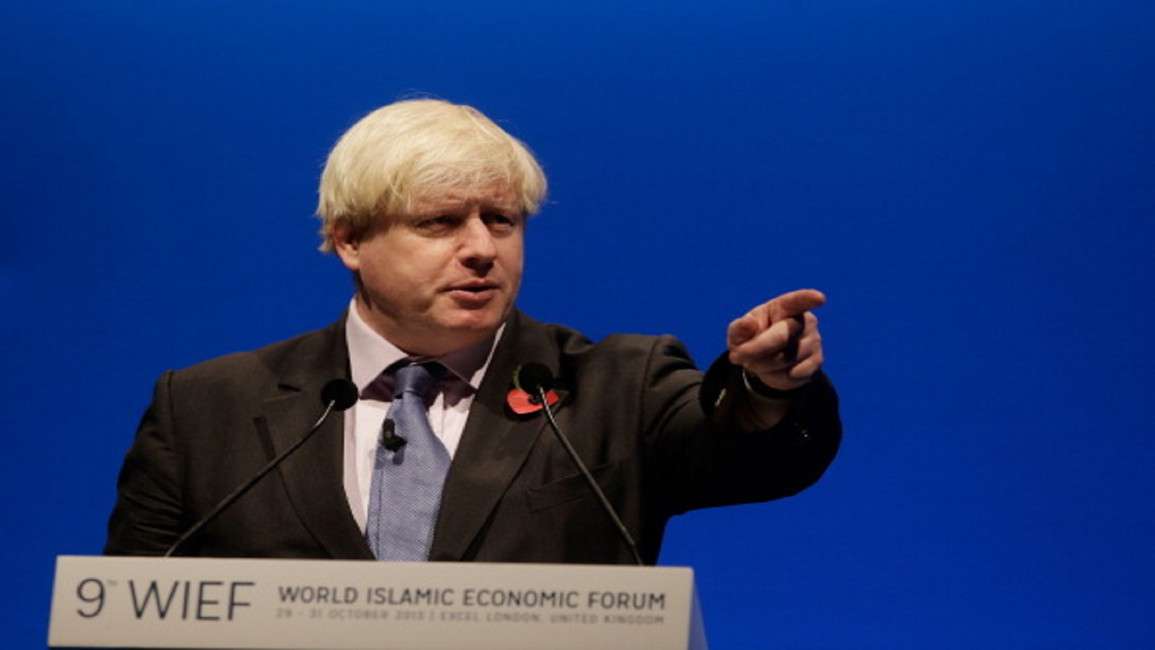
Boris Johnson's selective memory on Syria crimes and refugees
Boris Johnson's selective memory on Syria crimes and refugees
By calling Russia out for doing exactly what Britain is doing, the foreign secretary has found himself in a moral discrepancy commonly described as hypocrisy.
3 min read
Boris Johnson appears to be exploiting Syrians for geopolitical gain [AFP]
British Foreign Secretary Boris Johnson's failed bid for G7 sanctions against Russian backers of Bashar al-Assad's regime neglected to mention his own government had been offering sanctuary to relatives of suspected Syrian war criminals.
The G7 meeting, held in Lucca, Italy, was dominated by talks over the chemical weapons attack on the rebel-held town of Khan Sheikhun, in which at least 86 people, including 19 children, were killed.
At face value, Johnson's call for sanctions seems to be simple and sound; Moscow's support for a dictator who has launched a chemical weapons attack is wrong, and officials who enable such wrongdoings must be punished.
| Read more: G7 hopes to restire Russia relations while backing Trump |
However, Johnson glossed over the fact that the UK Home Office itself appears complicit in exactly what the foreign secretary is condemning Russian officials for.
Amr Armanazi, a 72-year-old weapons manufacturer, was placed on US sanctions in 2012 after his Syrian Scientific Studies and Research Center was found to be developing chemical and biological weapons, and missiles for their delivery.
Armanazi was caught overseeing a facility that was involved in the production of sarin nerve agent.
Despite this, his brother and son were granted UK citizenship, even though the weaponmaker, described as Assad's "chemical weapons chief", had been placed on UK and EU sanctions lists as evidence against him piled up.
 |
Some may argue that this is not a double-standard, that it would be unfair to place them under sanctions merely because of whom they are related to |  |
The sarin supremo has even reportedly had the luxury of routinely visiting his newly British brother, Ghayth, and his son, Bisher.
While sanctions usually freeze or strip assets, Bisher and Ghayth still have properties in London. Ghayth reportedly owns a £1.2m flat in Fulham and another in West Kensington worth £1.5m. Bisher has an apartment worth £700,000 in Putney, according to reports.
Some may argue that this is not a double-standard, that it would be unfair to place them under sanctions merely because of whom they are related to. However, by calling Russia out, while Britain acts in a similar manner, Johnson has placed himself in a moral discrepancy that is commonly described as hypocrisy.
It is clear that, while Boris Johnson was not wrong to call for sanctions against Russian allies of the Syrian regime, his politically charged pseudo-morality forgets the less affluent countryfolk of Bisher and Ghayth stuck in refugee camps.
 |
Boris Johnson himself, in his usual eloquent manner, told his European counterparts who were critical of Britain's harsh stance on refugees to 'bog off' |  |
These desperate refugees were once described by a former prime minister as surging towards Britain in "swarms". They were further animalised when referring to the Calais refugee camp as "the jungle".
Boris Johnson himself, in his usual eloquent manner, told his European counterparts who were critical of Britain's harsh stance on refugees to "bog off".
Politicians on the international stage treating the Syrian people as chips in a high-stakes diplomatic poker game is one of the main reasons the wat has dragged on for so long. Johnson's hypocrisy is not an isolated incident in international fora, but a representation of how Syrian lives are dismissed and only remembered when politicians find it convenient.
Exploiting Syria for geopolitcal gain, especially when Britain is evidently as complicit in its providing of amnesty to families of war criminals, directly exacerbates the Syria crisis instead of resolving it.
The international community is toying with the lives of more than 22 million Syrians, when they need us more than ever. The use of sanctions have become a way of unilaterally apportioning blame, instead of using them for their potential to be a strong political tool in ending the conflict.
The Home Office had not responded to requests for comment by time of publication.




